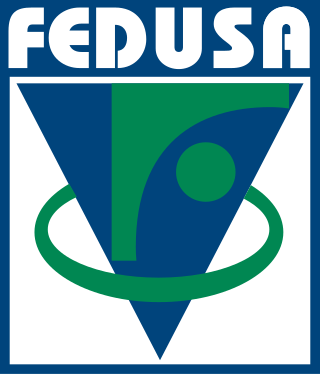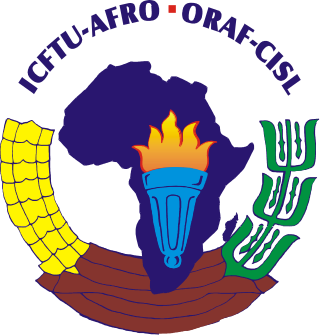Related Research Articles

The International Confederation of Free Trade Unions (ICFTU) was an international trade union. It came into being on 7 December 1949 following a split within the World Federation of Trade Unions (WFTU), and was dissolved on 31 October 2006 when it merged with the World Confederation of Labour (WCL) to form the International Trade Union Confederation (ITUC).
UDT may refer to:

The World Confederation of Labour (WCL) was an international labour organization founded in 1920 and based in Europe. Fascist governments of the 1930s repressed the federation and imprisoned many of its leaders, limiting operations until the end of World War II. In 2006 it became part of the International Trade Union Confederation (ITUC), ending its existence as an independent organization.

Sharan Leslie Burrow is an Australian trade unionist who served as the general secretary of the International Trade Union Confederation (ITUC) from 2010 to 2022 and as president of the Australian Council of Trade Unions (ACTU) from 2000 to 2010. She was the first woman to become General Secretary of the ITUC since its foundation in 2006, and was the second woman to become President of the ACTU.
The Antigua Workers' Union (AWU) or (ABWU) is a national trade union centre of Antigua and Barbuda. It was formed in 1967 after a split from the ATLU. The AWU created the Progressive Labour Movement (UPP) in 1970.

The Latin American Confederation of Workers, was the World Confederation of Labour's (WCL) regional organization for Latin America and the Caribbean. The WCL merged with the International Confederation of Free Trade Unions in 2006, and in 2008, CLAT merged with the ICFTU Inter American Regional Organisation of Workers to form the Trade Union Confederation of the Americas.
The General Federation of Workers Trade Unions in Bahrain(Formerly known as the General Committee for Bahrain Workers) (GFWTUB) is a national trade union federation in Bahrain. It was established in 2002, by the Workers Trade Union Law granting workers the right to organize collectively.
The Belarusian Congress of Democratic Trade Unions was a confederation and center of trade unions in Belarus. It had 15,000 members in 4 affiliated unions and its headquarters were located in Minsk.
The Moroccan Workers' Union is the oldest national trade union center in Morocco. It was formed in 1955 by Mahjoub Ben Seddik. With a membership of more than 306,000, UMT represents workers in both the private and public sectors of the economy.

The Federation of Unions of South Africa (FEDUSA) is the second largest national trade union center in South Africa.

The International Trade Union Confederation (ITUC) is the world's largest trade union federation.
Trade unions in Benin operate in relative freedom, with approximately 75% of the formal sector being unionized. There are, however, concerns expressed by the International Labour Organization (ILO) and the International Trade Union Confederation (ITUC) about the discrepancies between the government's Labour Code and the labour practices outlined by ILO Conventions 87 and 98 - specifically the right of unions to form without government approval, the right of seafarers to organize or strike, and restrictions on strikes.
Trade Unions in Botswana operate within a longstanding democratic system in which the government of Botswana has ratified the International Labour Organization's core conventions, including Conventions 87 and 98.

The ICFTU African Regional Organisation (AFRO) was a regional organisation of the International Confederation of Free Trade Unions (ICFTU), representing trade unions from countries in Africa.

The ICFTU Inter American Regional Organisation of Workers was the regional organization of the International Confederation of Free Trade Unions (ICFTU) for the Americas.
The Bangladesh Garment Workers Trade Union Centre (GWTUC) is a trade union federation of garment workers in Bangladesh. It is one of the largest trade unions in that sector, with more than 20 factory trade unions affiliated to it. It has enough members to be formally recognised as a trade union, but does not have that status, as is not uncommon for left-oriented unions in Bangladesh. Politically, GWTUC is aligned with the Communist Party of Bangladesh.
Govindasamy Rajasekaran was a Malaysian trade union leader.
There are two main trade union confederations in Burundi; the Confederation of Trade Unions of Burundi (COSYBU) and the Trade Union Confederation of Burundi (CSB). Both are affiliated to the International Trade Union Confederation (ITUC).
There are six recognized trade union confederations in Cameroon as of 2021. The main federation Confederation of Cameroon Trade Union has undergone many organizational splits and attempts by the government to retain its influence.
There are five recognized trade union confederations in Chad as of 2021:
References
- ^ ICTUR; et al., eds. (2005). Trade Unions of the World (6th ed.). London, UK: John Harper Publishing. ISBN 0-9543811-5-7.
- ^ Harowo.com report on arrests [usurped] .
- ^ ITUC report on arrests.